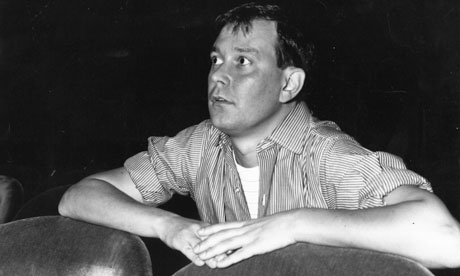
Before I’d ever seen a Joe Orton play I’d read Prick Up Your Ears, John Lahr’s masterful biography of the playwright. Lahr was back on Orton’s north London stamping ground last week, discussing the playwright with psychoanalyst Don Campbell at Islington Museum. The museum currently has an unmissable exhibition of the library books defaced by Orton and his boyfriend Kenneth Halliwell. One of my favourites is a book about John Betjeman by Derek Stanford and Neville Spearman, on whose jacket has been pasted a picture of a heavily tattooed old man standing in his underpants.
Orton and Halliwell got six months in jail for their crimes, a heavy sentence even in 1962. The experience was the making of Orton, who wrote his first hit play Entertaining Mr Sloane the following year, but it nearly broke Halliwell. Over the next five years Halliwell found himself left behind by Orton, whose career was rocketing, and in August 1967, Halliwell beat Orton’s brains out with a hammer in the flat they shared, before taking an overdose.
The pair’s last eight months is chronicled in Orton’s diary, edited by Lahr. “I think they’re the best diary of the period – wonderfully written,” Lahr told me over the phone the week before the talk. “A large portion of English diaries are by the ruling classes. This is, to a certain extent, the diary of an ordinary contemporary Englishman in the 60s.” Albeit, it has to be said, an Englishman admired by both Tennessee Williams and Paul McCartney, and who wrote jaw-dropping accounts of his gay sexual exploits in public toilets off London’s Holloway Road.
Now the New Yorker’s senior drama critic, a post he has held since 1992, Lahr was drama editor of the Grove press, which published Orton’s plays, when he first read the playwright’s diary. “I read one sentence and I knew that I wanted to write a biography of him. The sentence was, ‘Much more fucking and they’ll be screaming hysterics in next to no time.’ Revenge is the motive for great comedy. That wish to drive a public crazy is a very ancient Dionysian impulse. I recognised that as the sign of a true comic, so that’s why I went for it.”
It’s a testament to Lahr’s research that very little new information has come to light since Prick Up Your Ears was published in 1978: his remains the definitive account of Orton’s life and death. As Lahr proudly pointed out to me, it’s still in print, and cemented Orton’s reputation as a great playwright, which had taken a drubbing in the immediate aftermath of his death. “Most criticism comes after the fact – in this case I could make an audience for Orton to a certain degree. He was a great stylist, but he didn’t live to teach directors and actors how to do his plays like Coward or Pinter or Shaw, so the book had the opportunity to do that.” Not only that, Prick Up Your Ears went on to be turned into a play and a film, the latter scripted by Alan Bennett and starring Gary Oldman as Orton.
Having read the diaries, I had always been puzzled by Kenneth Halliwell’s suicide note, which read: “If you read his diary, all will be explained. KH PS: Especially the latter part.” To me they don’t explain such a violent reaction, but Lahr disagreed. “It seems to me straightforward envy, and the psychology of envy is very hate-filled,” he suggested.
Halliwell, he went on, was also an aspiring writer – and later collagist – but “when he wrote, he didn’t have the juice. Orton had found a new confidence and outgrown Halliwell and wanted freedom. Have you ever lived in a symbiotic relationship? It’s like a barnacle on your hull – he couldn’t shed him.”
Lahr was astonished when I asked whether Orton needed Halliwell; whether, in fact, the claustrophobia fed his writing. “No, the other way around,” he said. “Orton had a whole life and gift apart from Halliwell, which is what Halliwell couldn’t stand. That’s why he killed him.”
Lahr believes that Orton would have gone from strength to strength if he’d lived. “The diaries, What the Butler Saw and the two TV plays [The Erpingham Camp and Funeral Games] were all rewritten in the last eight months of his life. That’s one of the many tragedies – that he’d only just found his voice when he was killed.”
Such a savage satirist, whose mocking tone and, Lahr says, “refusal to suffer” made an indelible mark on theatre history, would have had a lot of fun tearing into our own age of fear, financial catastrophe, religious fundamentalism and terrorism. “My mind just focuses on the line [from Funeral Games] ‘All classes are criminal. We live in an age of equality,’” Lahr said. “That’s what he would have made of it.”
• This article was amended on 2 August 2018. An earlier version wrongly said it was Lahr who, with Halliwell, got six months in jail for defacing library books.

